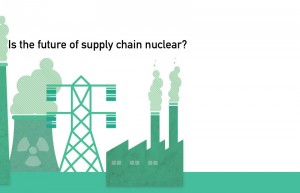05 Jun 2015 Is Nuclear Power The Answer To Shipping Sustainability?
The future of marine transportation should include nuclear-powered vessels
More than 70% of our planet’s surface is covered in water and, yet, few people concern themselves with anything past the first couple miles off the beaches. Even fewer, still, are aware that 90% of all the world’s products are transported on massive container ships – the length of multiple football fields – that travel the oceans.
Maersk’s new Triple-E vessel is advertised to be able to carry up to 18,000 TEU (Twenty Foot Equivalent Units) containers, with each container generating only three grams of CO2 per kilometre en route from Europe to Asia. This seems incredibly efficient: the same products would generate 560 grams of CO2 if it were transported by air.
In the aggregate, however, marine transportation is one of the world’s heaviest polluters, contributing 4% of the world’s total annual greenhouse gas emissions. A 2009 study found that the 15 largest ships in service – of the more than 10,000 total – produced emissions equal to that of 760 million cars. In context: that is more than the number of registered cars in Canada, USA, and China combined. If marine shipping were ranked among nations, it would be the sixth heaviest polluter in the world.
Faced with all these statistics, the question is: What can be done to change the industry to be more environmentally sustainable while maintaining profitability?
The alternative I propose is nuclear powered container ships. This alternative comes with immense challenges, granted, but I believe may lead to a future of sustainable transportation.
Before you start imagining thousands of floating Chernobyl and Fukushima disasters waiting to happen, what I am advocating for is not an unprecedented concept. In fact, there have been 13 nuclear powered cargo ships and ice breakers commissioned, half of which are still active.
Moreover, it is not uncommon for military submarines to be nuclear powered. A July 2014 BBC article about the USA’s decommissioned nuclear cargo-passenger vessel, the NS Savannah, even quoted the chief engineer stating: “In due time it will happen, the prospects are reasonable for a resurgence of nuclear power, there is a future for nuclear power ships, it’s just a matter of time.”
The sentiment behind his statement is that more of the public will eventually start to notice the environmental problems of ocean shipping and the industry will be forced to change. With nuclear powered vessels, the industry can progress towards ships that contribute no CO2 and produce zero greenhouse emissions.
Aside from the environmental benefits, a corporation’s bottom line will also greatly benefit. A medium-sized container ship uses 260 tons of heavy fuel oils to power 51,480 kilowatts from the diesel engine. This results in a daily cost of $52,000. The same amount of nuclear powered energy would cost slightly less than $9,000. While it is undeniable that nuclear-powered ships would have a substantially higher initial cost, it is realistic to believe a corporations would eventually profit over a ship’s average 26-year lifespan.
In addition to the direct benefits, this change would also inject vast amounts of investment dollars into the nuclear physics community resulting in further innovation, cheaper and safer reactors, netting greater benefits.
As I stated earlier, this change would come with immense challenges and strong opposition.
With the Fukushima disaster still vivid in much of the public’s mind, nuclear power has a bad reputation. Germany, for instance, is vowing to close all of its nuclear power plants by 2022.
And, there have been multiple events where the reactors on container ships have forced the dump of mildly radioactive water into the ocean, none of f which have come remotely close to a catastrophe in the vein of the Fukushima event. Finally, there would, likely, be substantial lobbying efforts by oil corporations, as such changes would result in the loss of collective sales of one billion tons of fuel annually.
Without a doubt, it is only a matter of time before the marine transportation industry will be forced to answer the question of how to become more environmentally sustainable. Of the alternative modes of energy available, I believe nuclear to be the only one powerful enough to transport 90% of the world’s goods across vast oceans. Only time will tell, of course, whether the industry agrees and adopts nuclear power as the solution, but it must be warrant considerable discussion.
This article originally appeared in the debut issue of Procurement Sense Magazine, a new magazine for industry trends and insights powered by Procurify. Download your free copy here.



